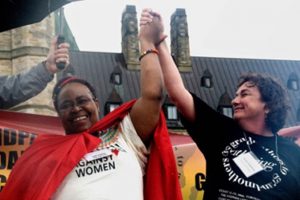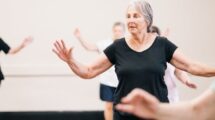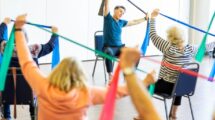Healthy Boomer
By Peggy Edwards
It’s time to speak up and take action
 On December 10,2020,we celebrated Human Rights Day — the day the United Nations adopted, in 1948, the Universal Declaration of Human Rights.
On December 10,2020,we celebrated Human Rights Day — the day the United Nations adopted, in 1948, the Universal Declaration of Human Rights.
All people regardless of sex, gender identity, race, ethnicity, ancestral origin, and age deserve the rights to health, dignity, education, social security, a safe home, freedom from violence, non-discrimination and protection when needed. But COVID-19 has shone a light on how ageism, vulnerability and invisibility has denied many grandmothers and older women these rights.
In Canada (and other developed countries), ageism prompted a large and toxic social media response which portrayed COVID-19 as an effective way to do away with the burden of the older generation via hashtags such as #boomer-remover and #granny-killer.
To our national shame, we have seen over 95 per cent of all COVID deaths in persons over the age of 60,and over 80 per cent of deaths occurring in long-term care homes, whose residents are predominately old women. We were horrified by the conditions found in some homes in Quebec and documented by the military teams, who were called in to help five nursing homes in Ontario. Abandoned, dehydrated residents in soiled beds calling out for help, often in crowded, dirty rooms. Under-staffed homes with overworked, under-paid and sick support workers (mostly women) who did not have proper safety equipment nor training in infection control and were afraid to speak up about the appalling conditions. Aggravated, weeping family members who for the most part could not see or touch their grandmother, older parent, partner or friend. Grieving family members who watched their loved ones die alone.
In sub-Saharan Africa, the courageous grandmothers and older women who are raising millions of children and young people who have been orphaned by AIDS, now face the quadruple jeopardy of age, gender, poverty and the intersection of two pandemics at the same time. HIV and AIDS is not over. In 2018, an estimated 470,000 people died of AIDS-related causes in sub-Saharan Africa. This number could double if the provision of healthcare to people living with HIV is disrupted during the coronavirus crisis. Older women and grandmothers who often serve as home support workers in the community are especially vulnerable to contracting COVID-19 because of chronic health problems and compromised immune systems due to other infections they have experienced over their life span. Few of the older women and grandmothers are suffering and dying in long-term care because the great majority live in countries that do not have long-term care systems and facilities. They live, work, and die in the community.
Despite poverty, the stigma associated with HIV and AIDS, and invisibility on the world stage, the African grandmothers have made enormous progress with housing, food, being parents again and getting their grandchildren into school. Supported by community groups and their own social support groups, they are leading movements and mobilizing at local, national, and international levels to claim their human rights. But the COVID-19 pandemic has exacerbated the denial of their rights to health, decent work, non-discrimination, and access to adequate food and medicine. The public health precautions we take for granted, such as physical distancing and repeated hand washing is impossible in crowded housing that may not have running water. Lock downs and isolation policies restrict their access to markets where they sell their crops, crafts and other goods, and buy food for their families each day. As in Canada, domestic violence, including the abuse of girls and older women, has increased. School closures have led to the end of what they have worked so hard to achieve — quality education for both girls and boys. The longer schools are closed, the higher the risk that girls won’t return to school when classes resume. For many children, being out of school means missing what might have been their most substantial meal of the day.
“It is time to protect and enshrine the rights of older persons in a Convention on the Rights of Older Persons,” says Margaret Gillis, President of the International Longevity Centre, Canada (ILC) and a well-known spokesperson for the rights of older people.
Canada has long been a world leader in human rights. The 1948 Universal Declaration of Human Rights was drafted by a Canadian, John Peters Humphrey. Canada was a persuasive champion of the Conventions on the Rights of Children and People with Disabilities and now (finally) signing on to the Convention on the Rights of Indigenous Peoples.
These Conventions make a difference. They require nation states to monitor and report on the conditions and rights denied. It is time to show leadership on protecting the rights of grandma and other older people. To show appreciation for the enormous contributions that older people make to families, communities and the gross national product. To show intergenerational and international solidarity. To recognize how much we love our grandparents.
Gillis says, “A Convention on the Rights of Older Persons sees older people as rights holders. It can combat ageism, guide policy making, improve government accountability and educate and empower all of us. Enacting this global Convention will provide binding protection under international law for grandmothers and older women in Africa and in Canada, and indeed for all older persons regardless of their gender identity or place of origin.”
Our slogan at ILC Canada is that human rights do not have a best before date. They are inherent, lifelong, and grounded in compassion, empathy and solidarity.”
The COVID-19 pandemic has been a magnifying glass on the ageism, and human rights abuses faced by older people around the world. A new UN Convention on the Rights of Older Persons would lay the foundations to make sure such violations never happen again.
Learn more and take action
Download, endorse and send a letter to key political leaders asking Canada to lead the push for a Convention on the Rights of Older Persons — on the ILC Canada website at ilccanada.org/images/Letter.pdf
Visit the website of the Grandmothers Advocacy Network (GRAN) to learn more about the human rights of older women/grandmothers in sub-Saharan Africa: grandmothersadvocacy.org
Visit the website of the Stephen Lewis Foundation Grandmothers Campaign at grandmotherscampaign.org to learn more about grandmothers raising young people in sub-Saharan Africa. Consider donating to the campaign and/or joining a Granny group in your area. n
Peggy Edwards is a well-known writer and speaker on aging and health and is a co-author of The Healthy Boomer: A No Nonsense Midlife Health Guide for Women and Men, The Juggling Act: The Healthy Boomer’s Guide to Achieving Balance in Midlife, and Intentional Grandparenting: A Boomer’s Guide, all available at amazon.ca






